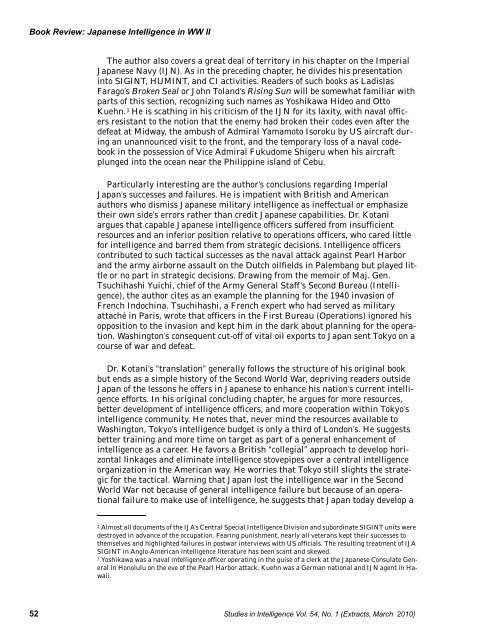Studies in Intelligence - The Black Vault
Studies in Intelligence - The Black Vault
Studies in Intelligence - The Black Vault
You also want an ePaper? Increase the reach of your titles
YUMPU automatically turns print PDFs into web optimized ePapers that Google loves.
Book Review: Japanese <strong>Intelligence</strong> <strong>in</strong> WW II<br />
<strong>The</strong> author also covers a great deal of territory <strong>in</strong> his chapter on the Imperial<br />
Japanese Navy (IJN). As <strong>in</strong> the preced<strong>in</strong>g chapter, he divides his presentation<br />
<strong>in</strong>to SIGINT, HUMINT, and CI activities. Readers of such books as Ladislas<br />
Farago’s Broken Seal or John Toland’s Ris<strong>in</strong>g Sun will be somewhat familiar with<br />
parts of this section, recogniz<strong>in</strong>g such names as Yoshikawa Hideo and Otto<br />
Kuehn. 3 He is scath<strong>in</strong>g <strong>in</strong> his criticism of the IJN for its laxity, with naval officers<br />
resistant to the notion that the enemy had broken their codes even after the<br />
defeat at Midway, the ambush of Admiral Yamamoto Isoroku by US aircraft dur<strong>in</strong>g<br />
an unannounced visit to the front, and the temporary loss of a naval codebook<br />
<strong>in</strong> the possession of Vice Admiral Fukudome Shigeru when his aircraft<br />
plunged <strong>in</strong>to the ocean near the Philipp<strong>in</strong>e island of Cebu.<br />
Particularly <strong>in</strong>terest<strong>in</strong>g are the author’s conclusions regard<strong>in</strong>g Imperial<br />
Japan’s successes and failures. He is impatient with British and American<br />
authors who dismiss Japanese military <strong>in</strong>telligence as <strong>in</strong>effectual or emphasize<br />
their own side’s errors rather than credit Japanese capabilities. Dr. Kotani<br />
argues that capable Japanese <strong>in</strong>telligence officers suffered from <strong>in</strong>sufficient<br />
resources and an <strong>in</strong>ferior position relative to operations officers, who cared little<br />
for <strong>in</strong>telligence and barred them from strategic decisions. <strong>Intelligence</strong> officers<br />
contributed to such tactical successes as the naval attack aga<strong>in</strong>st Pearl Harbor<br />
and the army airborne assault on the Dutch oilfields <strong>in</strong> Palembang but played little<br />
or no part <strong>in</strong> strategic decisions. Draw<strong>in</strong>g from the memoir of Maj. Gen.<br />
Tsuchihashi Yuichi, chief of the Army General Staff’s Second Bureau (<strong>Intelligence</strong>),<br />
the author cites as an example the plann<strong>in</strong>g for the 1940 <strong>in</strong>vasion of<br />
French Indoch<strong>in</strong>a. Tsuchihashi, a French expert who had served as military<br />
attaché <strong>in</strong> Paris, wrote that officers <strong>in</strong> the First Bureau (Operations) ignored his<br />
opposition to the <strong>in</strong>vasion and kept him <strong>in</strong> the dark about plann<strong>in</strong>g for the operation.<br />
Wash<strong>in</strong>gton’s consequent cut-off of vital oil exports to Japan sent Tokyo on a<br />
course of war and defeat.<br />
Dr. Kotani’s “translation” generally follows the structure of his orig<strong>in</strong>al book<br />
but ends as a simple history of the Second World War, depriv<strong>in</strong>g readers outside<br />
Japan of the lessons he offers <strong>in</strong> Japanese to enhance his nation’s current <strong>in</strong>telligence<br />
efforts. In his orig<strong>in</strong>al conclud<strong>in</strong>g chapter, he argues for more resources,<br />
better development of <strong>in</strong>telligence officers, and more cooperation with<strong>in</strong> Tokyo’s<br />
<strong>in</strong>telligence community. He notes that, never m<strong>in</strong>d the resources available to<br />
Wash<strong>in</strong>gton, Tokyo’s <strong>in</strong>telligence budget is only a third of London’s. He suggests<br />
better tra<strong>in</strong><strong>in</strong>g and more time on target as part of a general enhancement of<br />
<strong>in</strong>telligence as a career. He favors a British “collegial” approach to develop horizontal<br />
l<strong>in</strong>kages and elim<strong>in</strong>ate <strong>in</strong>telligence stovepipes over a central <strong>in</strong>telligence<br />
organization <strong>in</strong> the American way. He worries that Tokyo still slights the strategic<br />
for the tactical. Warn<strong>in</strong>g that Japan lost the <strong>in</strong>telligence war <strong>in</strong> the Second<br />
World War not because of general <strong>in</strong>telligence failure but because of an operational<br />
failure to make use of <strong>in</strong>telligence, he suggests that Japan today develop a<br />
2 Almost all documents of the IJA’s Central Special <strong>Intelligence</strong> Division and subord<strong>in</strong>ate SIGINT units were<br />
destroyed <strong>in</strong> advance of the occupation. Fear<strong>in</strong>g punishment, nearly all veterans kept their successes to<br />
themselves and highlighted failures <strong>in</strong> postwar <strong>in</strong>terviews with US officials. <strong>The</strong> result<strong>in</strong>g treatment of IJA<br />
SIGINT <strong>in</strong> Anglo-American <strong>in</strong>telligence literature has been scant and skewed.<br />
3<br />
Yoshikawa was a naval <strong>in</strong>telligence officer operat<strong>in</strong>g <strong>in</strong> the guise of a clerk at the Japanese Consulate General<br />
<strong>in</strong> Honolulu on the eve of the Pearl Harbor attack. Kuehn was a German national and IJN agent <strong>in</strong> Hawaii.<br />
52 <strong>Studies</strong> <strong>in</strong> <strong>Intelligence</strong> Vol. 54, No. 1 (Extracts, March 2010)





![Combat Support in Korea [270 Pages] - The Black Vault](https://img.yumpu.com/49796461/1/190x71/combat-support-in-korea-270-pages-the-black-vault.jpg?quality=85)











